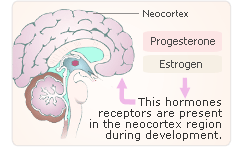
Epilepsy is a serious condition that is characterized by seizures. It is also a very common condition. Up to 3% of the population will receive a diagnosis of epilepsy by the time they are 75 years old. Although it cannot be cured, it can be managed. Since men and women differ in regard to physiological makeup and life stage (e.g. menopause), management of the disease has to be sex-specific. Hormones such as progesterone hormones, which cause women to suffer menopause symptoms, may also exacerbate seizures during particular points in their cycle. It is important that menopause symptoms, the progesterone hormone and its relationship to epilepsy be studied. The 2004 study by William Tatum IV, “Updates on the Treatment of Epilepsy in Women” attempts to do just that.
Men and women differ greatly because of the genetically determined effect that sex hormones such as the progesterone hormone have on their biological systems. These sex steroids have profound effects on the body, including the causation of menopause symptoms. As an example, the estrogen and progesterone hormone receptors in the brain influence maturation during female development. Studies on animals have shown/demonstrated that estrogen and progesterone hormone receptors are present in the neocortex region during development. After puberty, their numbers lower/decrease in the neocortex region. It has been found that estrogen and the progesterone hormone influence the abnormal functioning of cortical neurons by altering the body's seizure threshold. Another development to consider is that the medicine used to treat seizures may alter levels of sex hormones such as the progesterone hormone.
Other side effects of treatment to be taken into account are: gingical hyperplasia, weight gain, excessive hair growth and tremor. These are primarily cosmetic issues which effect body image and self-esteem. However, they can also affect/change ideal body weight and bone mass. It is crucial that the effects of epilepsy treatment on a woman's body on menopause symptoms and the progesterone hormone be understood so that an appropriate treatment may be provided for women suffering from epilepsy.
Seizure patterns may change with the menstrual cycle and they have also been known to change during the female reproductive cycle, for example menopause and menopause symptoms. Due to the complex hormonal process involved during these processes, including the interaction between the body and the progesterone hormone, the effects that menopause symptoms and the progesterone hormone have on the body is always changing. It is good that studies such as this take this into consideration.